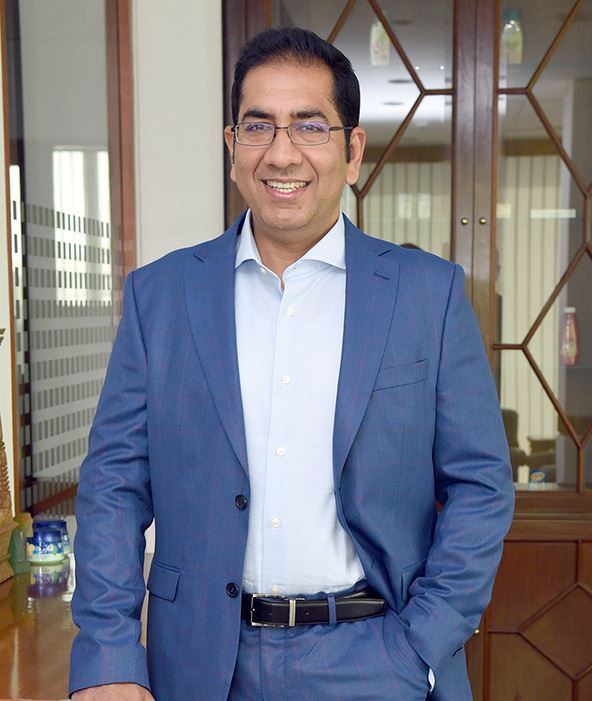 I firmly believe that our learnings from COVID have forged
us into a more responsive, resilient, and responsible organization.
I firmly believe that our learnings from COVID have forged
us into a more responsive, resilient, and responsible organization.
Mohit Malhotra
Chief Executive Officer

Mohit Malhotra (MM): Out of adversity comes Innovation. I firmly believe that our learnings from COVID have forged us into a more responsive, resilient, and responsible organization. Our response to the crisis and ability to meet consumer demands in such challenging times made it clear that we are far more capable of what we had imagined, we have emerged stronger. From surviving to thriving, we have come a long way. Our operational efficiencies have been enhanced, the supply chain ecosystem has become robust, the pace of innovation and growth has accelerated, rural reach has expanded, our e-commerce footprint has grown and most importantly we can launch new products in shorter timelines with lower cost and lesser resources involved. We have also been working towards cost optimization through Project Samriddhi, and saved ₹100 cr in fiscal 2021-22. COVID also acted as a catalyst for bringing together all functions seamlessly. Some of the many latent benefits that came in conjunction with the challenges of the pandemic include a better and faster decisionmaking approach, increased focus on upskilling, and individual and team productivity.
With these learnings we have developed a more optimistic future outlook, we believe that we are well-positioned to meet the challenges and generate sustainable long-term growth. We are now leveraging new opportunities. COVID-19 has dramatically transformed the purchasing behavior of consumers. E-commerce has emerged as the most preferred method of purchase. This trend is only set to grow in the coming years. To leverage the opportunities that the e-commerce space has to offer, Dabur has introduced a series of new products exclusively for online markets. Some of these products, created in association with online retailers, continue to be exclusively available only in the e-marketplaces while some others have been introduced in Modern Trade outlets as well during the year. Our e-commerce business contributed to 6.5% of our sales in fiscal 2021-22.
MM: The last quarter of fiscal 21-22 witnessed increasing cost headwinds drastically affecting the purchasing power of the consumers. The substantial increase in input costs was one of the major challenges facing Dabur. However, despite the heightening inflationary pressure, Dabur delivered steady revenue growth. Dabur reported a Consolidated Revenue growth of 7.7% at ₹2,518 Crore in the fourth quarter of the 2021-22 financial year, up from ₹2,337 Crore in the same quarter a year ago. Our learnings from COVID have enabled us to act with agility and resilience even in the face of adversity.
Our response to mounting inflationary pressures included cost control measures coupled with a calibrated increase in our prices supported by an innovation-led portfolio. We feel contented that even in such challenging times when there is a substantial shrinkage in overall consumption, we have been able to increase our market share across 99% of our product portfolio. To overcome the challenges posed by the cost headwinds we aim to leverage our Power brands and continue deploying investments and resources behind them. Our strategy is centered around consumer-centric innovations and greater flexibility in our go-to-market strategy.
MM: The FMCG industry is the fourth largest sector in the Indian economy. The market has always been a growing sector in urban areas but as witnessed in the past several quarters the demand in rural India in this sector has outdone its growth in urban areas. With the augmenting impact of digital media, we can see a shift in consumer choices from non-branded products to trusted brands. People in rural India are making conscious choices and therefore, top FMCG players are chasing the rural market to expand their reach. Dabur has been one of the leading players in the market and is taking decisive actions to significantly increase its rural footprint. Till last year we had a direct coverage of 59,217 villages across India. We had set ourselves a target to expand our rural outreach to 80,000 villages over the next two years, but we surpassed this target and accelerated our rural connection to 89,840 villages by the end of fiscal 21-22.
Expanding our rural reach continues to be a strategic priority in the coming years. Our go-to-market approach aims at ushering in innovation to our portfolio coupled with local marketing and advertising strategies to further build brand awareness in rural India.
MM: With the mounting pressures of climate change on our planet and a consequential surge in existential challenges, government and other stakeholders are expecting major players like Dabur to play a pivotal role in solving environmental and societal problems. We want to live up to the expectations of our stakeholders and are committed to creating a greener and sustainable planet for our future generations. Sustainability is our core philosophy and we have always believed that growth and sustainability are mutually reinforcing. Our journey to becoming India’s first plastic waste-neutral company manifests how we have been consciously striving to integrate ESG considerations into our functioning, thereby scaling up our responsible business conduct.
Our strategic priorities include being carbon neutral by 2040 and to become water positive by 2030. To achieve this, we primarily focus on energy use optimization, emission reduction initiatives, and water stewardship. Our people practices, meanwhile, remain focused on ensuring the health, safety, diversity, inclusion, and growth of our personnel. Our HR policies and practices have been increasingly aimed at fostering the right environment for a participative work culture meeting employee expectations and aspirations.
Dabur’s ESG strategy is not restricted to cementing policies and setting targets. To ensure that we are making progress in our ESG journey and making a positive impact on the environment, we continuously track our progress against our set targets and take necessary steps to level up our ESG performance.
MM: It has been Dabur’s long-standing belief that for growth to be responsible, it should go beyond numbers. It should do good for society and create a better environment. Dabur has always lived up to its core belief and the entire Dabur family takes utmost pride in the fact that we are India’s first ‘Plastic Waste Neutral’ consumer goods company. This fiscal year we collected, processed, and recycled 27,000 MT of post-consumer plastic waste. We are working in association with the government and school children to take reactive as well as preventive measures for plastic waste management. We not only collect plastic waste from cities and villages, but we also take necessary steps to prevent such waste from reaching our oceans and landfills and spread awareness about Plastic Waste Management. The waste collected is sent to recyclers, waste-to-energy plants, and cement kilns. We collect and recycle the same or more amount of plastic waste that we sell in our product packaging.
MM:: The eight Power Brands in our portfolio include Dabur Chyawanprash, Dabur Honey, Dabur Honitous, Dabur Pudin Hara, and Dabur Lal Tail in healthcare space; Dabur Amla, and Dabur Red Paste in the Personal care space; and Réal in the Foods category. The success of these brands is a true reflection of Dabur’s commitment to quality and improving the health and wellbeing of every Indian household. Considering the unparalleled importance of these brands in the daily lives of our consumers and to carry on our 138-year-old legacy built on quality and experience, it is our strategic priority to keep plowing congruous investments and resources behind these brands to maximize their reach, enhance distribution footprint, and enhance visibility. To keep pace with the ever-evolving needs of our consumers and stay relevant as the retail world transfigures in line with the changing needs of millennials and Gen Z we aim to expand our portfolio by ushering in innovation and launching new variants and formats under these categories.
Good strategies are followed by superior results and the sound implementation of these consumer and environment-centric strategies has allowed us to deliver positive results even in the hardest of times.
MM:: Dabur has successfully been able to expand its market reach across many economies by establishing a robust ecosystem of supply chains. This year we have reported constant currency revenue growth of 15.8% in our international business operations. We have market-leading positions across categories and geographies. Some of our hair care products in the personal care segment have ranked #1 in countries like Saudi Arabia, Egypt, and UAE.
We will continue to expand our distribution across economies by enhancing the availability and accessibility of our products. In order to capture the next level of growth, we will rely on relevanceled brand building, innovation and marketing. We aim to achieve it by evolving our business model to excel at local consumer closeness, leverage digital ubiquity and understand the Millennials and Gen-Z’s consumer preferences in international economies. We are also strengthening pathways into emerging e-marketplaces to diversify our economic levers. Furthermore, we will focus on integrating ESG into our legacy and new businesses for long-term sustainable value creation.
MM : The onslaught of COVID 19 and its rippling effects on the global economy posed business continuity challenges for many industries and organizations. However, Dabur stood firm against the odds with a strong business continuity plan in action.
Our operational efficiency is supported by a multiphase production facility wherein multiple plants can be used alternatively to ensure seamless production activities even in unprecedented scenarios like plant shutdown or plant failure. External Dependency is one of the significant issues posing a threat to business continuity.
We, at Dabur by all means, are prepared to overcome the challenges posed by external dependency. Our robust ecosystem of supply chains expands across multiple chains of suppliers thus mitigating the risk of dependency on just a handful for the supply of key raw materials. We select our suppliers and vendors only after conducting risk assessment activities. As a part of incident responsive activities, we focus on finding alternates for all our key input ingredients.


